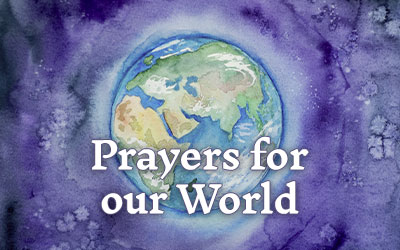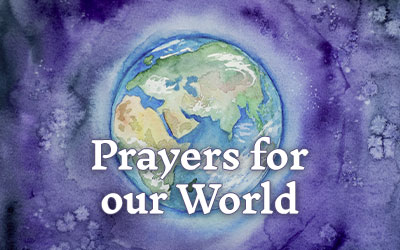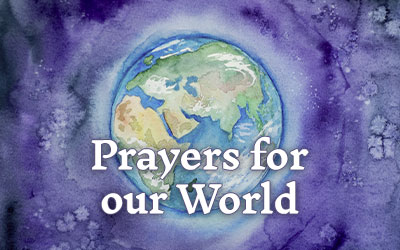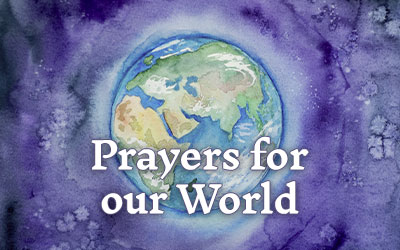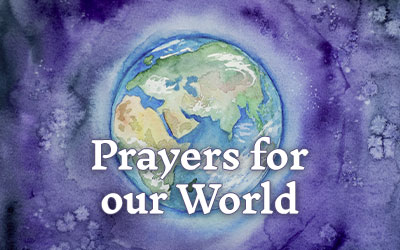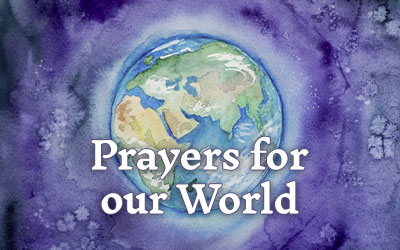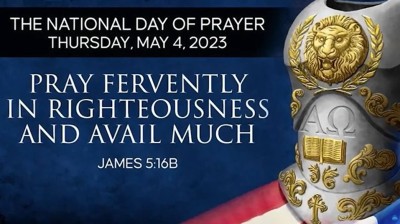Ukrainian officials say Russia is mustering its military might in the Luhansk region, in what Ukraine suspects is preparation for an offensive in the eastern area in coming weeks as the anniversary of Moscow's invasion approaches.
Military analysts anticipate a new push soon by Moscow's forces, with the Institute for the Study of War saying in an assessment that "an imminent Russian offensive in the coming months is the most likely course of action."
Ukraine is keen to secure more Western military aid as it tries to fend off the much larger Russian forces. It has already won pledges of tanks and now wants more.
The international criminal court has issued warrants for the arrest of Russian President Vladimir Putin and Maria Lvova-Belova, his commissioner for children’s rights, for directly supervising the atrocity of kidnapping Ukrainian children for “adoption” and “re-education” in Russia.
According to the Ukrainian government, 16,226 children have been deported to Russia, of whom 10,513 have been located, and 308 have returned. Reports indicate that there have been various reasons for the abduction, including “evacuation” from state institutions, transfer of children to camps, and parental consent, whether coerced or not.
Pray: A prayer for the one year anniversary of the war in Ukraine (Christian Aid)
Almighty and Great God, accept our gratitude for your boundless mercy towards us. Hear the supplication of our afflicted hearts for the land and people of Ukraine, as they confront foreign aggression and invasion. Open the eyes of those who have been overtaken by a spirit of deception and violence, that they be horrified by their works. Grant victory over the powers of evil that have arisen and bless Ukraine with your gifts of liberty, peace, tranquillity, and good fortune.
We implore you, O Merciful God, look with grace upon those who courageously defend their land. Remember the mothers and fathers, the innocent children, widows and orphans, the disabled and helpless, those seeking shelter and refuge, who reach out to you and to their fellow human beings looking for mercy and compassion.
Bless the hearts of those who have already shown great generosity and solidarity, and those who prepare to receive their Ukrainian brothers and sisters in Ukraine’s greatest time of need. Bring us together as your children, your creation, and instil in us your strength, wisdom and understanding. May you be praised and glorified, now and forever, and to the ages of ages. Amen
Sudan is currently facing a crisis involving a conflict between the military and civilians over control of the government. The conflict arose after the overthrow of former President Omar al-Bashir in 2019 and the subsequent formation of a transitional government led by civilians and the military.
In October 2021, the military launched a coup and arrested several members of the civilian government, including Prime Minister Abdalla Hamdok. This led to widespread protests and a call for a civilian-led transitional government. The military agreed to a power-sharing agreement with civilians in November, but tensions between the two sides remained.
In recent months, there have been reports of escalating violence in the Darfur region, including clashes between armed groups and government forces. The violence has displaced thousands of people and led to a humanitarian crisis. The government has also been accused of restricting media and internet access to suppress dissent.
Warring factions agreed to a 72-hour ceasefire, mediated by the US and Saudi Arabia, while Western, Arab, and Asian nations raced to evacuate their citizens from the country. The army and the rival paramilitary Rapid Support Forces (RSF) have not abided by several temporary truce deals over the past week. Fighting between them erupted on April 15, and at least 427 people have been killed so far, turning residential areas into war zones.
Millions of people remain trapped in their homes in the capital Khartoum and are running short on food and water. Tens of thousands of people have fled, including Sudanese and citizens from neighbouring countries, despite instability and difficult living conditions.
At least two convoys involved in evacuations came under fire at the weekend, and diplomats have been targeted in attacks, and at least five aid workers have been killed. The United Nations has expressed concern over the deteriorating situation in Sudan and has called for the release of political prisoners and the protection of human rights.
More: Independent, Al Jazeera
Pray: Heavenly Father, we come before you today with heavy hearts for the people of Sudan who are facing so much turmoil and suffering. We pray for peace to reign in their country and for the violence to come to an end. We ask that you comfort those who have lost loved ones or who have been injured in the conflict. We pray for your divine intervention to bring about a resolution that is just and fair for all parties involved.
As it says in Matthew 5:9, "Blessed are the peacemakers, for they will be called children of God." We ask that you raise up peacemakers in Sudan, individuals and groups who will work towards reconciliation and unity, and who will strive to bring an end to the conflict. We pray for their protection and provision as they seek to bring about positive change.
Lord, we also pray for the humanitarian crisis that is unfolding in Sudan. We ask that you provide for the basic needs of those who have been displaced, who are hungry and who lack access to medical care. We pray for the aid workers and organizations who are working tirelessly to provide relief to those who are suffering.
UN experts expressed outrage at the deliberate poisoning of more than 1200 schoolgirls in Iran’s major cities and the State’s failure to protect them, prevent further attacks and conduct swift investigations.
“The first reported poisoning of schoolgirls in Iran occurred on 30 November 2022, in the city of Qom. Since then, targeted chemical attacks against girls’ schools have been reported in 91 schools located in 20 provinces across Iran,” the experts said.
“The poisonings have already resulted in hundreds of schoolgirls being hospitalised. Many parents have removed their daughters from school for fear of these attacks,” they said.
“We are deeply concerned about the physical and mental well-being of these schoolgirls; their parents and the ability of the girls to enjoy their fundamental right to education. While arrests have just been announced, we remain gravely disturbed by the fact that for several months, State authorities not only failed to swiftly investigate the attacks, but repeatedly denied them until recently,” they added.
On 1 March 2023, Interior Minister Ahmad Vahidi, whose Ministry leads the investigations was still dismissing the intentional nature of the attacks, stating that 90 per cent of reported cases could be attributed to “stress." State-affiliated media outlets similarly described the poisoning incidents as an attempt by students to miss exams.
More: United Nations,
Pray: For the safety of all young girls in Iran, that they may be protected and healed and be able to live as children should. (Exodus 14:13-14)
For accountability and justice, that those in power may acknowledge the crimes being committed and bring the perpetrators to justice. (Psalm 89:14)
That God will unite and strengthen the Iranian Christians, that they may be effective witnesses and salt and light to their people and country. (Matthew 5: 13-16)
At least 27 people were killed in a wave of violence that targeted Christian communities in Nigeria's Kaduna state. International Christian Concern (ICC), a US-based persecution watchdog, suspects that the attacks were aimed at preventing Christians from voting in the gubernatorial election.
The attackers, who had previously killed 17 people in the Agwan Wakili area in Kaduna, returned and struck the Mubushi and Langson communities, killing at least 10 people. Witnesses suggested that the attack was carried out to prevent Christians from voting. A local leader called it a "political massacre of Christians" in areas where the ruling All Progressives Congress party was likely to lose the election. Christian rights groups have warned for years about the deteriorating religious freedom conditions in Nigeria, where Boko Haram and the Islamic State operate. The country ranks No. 6 on the Open Doors 2023 World Watch List of the top 50 worst countries for Christian persecution.
More: Christian Post
Pray: Heavenly Father, we pray for the families of the victims of the recent attacks on Christian communities in Nigeria. We ask for your comfort and peace to be with them during this difficult time. We take refuge in your word, which says in Psalm 34:18, "The Lord is close to the broken-hearted and saves those who are crushed in spirit."
Lord, we pray for your protection and safety over the Christian communities in Nigeria who are facing persecution and violence. We pray that you would be their refuge and strength, as your word says in Psalm 46:1, "God is our refuge and strength, an ever-present help in trouble."
God, we pray for the leaders of Nigeria and for all those in positions of authority to take action against the violence and persecution faced by Christians in the country. We pray that they would heed your word in Proverbs 31:8-9, which says, "Speak up for those who cannot speak for themselves, for the rights of all who are destitute. Speak up and judge fairly; defend the rights of the poor and needy."
China's navy has conducted over 120 flight sorties from its second aircraft carrier, the Shandong, in waters east of Taiwan and south of Japan over recent days. The exercises have raised concerns among US allies in the Indo-Pacific region.
The drills come after Taiwan's President, Tsai Ing-wen, met House Speaker Kevin McCarthy.
The manoeuvres were launched on Saturday to “punish” Taiwan, and China claims that its forces have successfully completed them. The exercises are the first for the Shandong in the western Pacific, and it marks a first for the carrier in the area that China defines as “far seas”.
Meanwhile Chinese President Xi Jinping's call with Ukrainian President Volodymyr Zelensky has brought China's peace efforts to the forefront again. China released a 12-point plan on February 24, which focuses on finding a political settlement through talks as the only way to stop the fighting. The plan calls for respecting the sovereignty of all countries and the opposition to the use of nuclear weapons, while also calling for an end to unilateral sanctions and bloc confrontations.
The West and Ukraine have urged China to use its influence over Russia to end the war, and China has proposed the only plan that both sides have said they will consider. China plans to send an envoy to Ukraine and other countries to discuss possible solutions to the conflict with all parties involved. While the call has been broadly welcomed, the West remains sceptical about China's capability and credibility.
More: South China Morning Post, Financial Times
Pray: For peace in Ukraine and for an end to the ongoing conflict that has caused so much suffering and pain. We ask that all parties involved in the conflict come together in a spirit of cooperation and dialogue to find a lasting and just solution that respects the sovereignty of all countries and promotes the well-being of all people. (Romans 15:13)
For the success of all peace efforts, including the recent 12-point plan proposed by China. May these efforts be guided by wisdom, compassion, and a deep commitment to the common good.
For the safety and well-being of all those affected by the conflict, especially the innocent civilians who have been caught in the crossfire. May they find comfort and support in their time of need, and may they be able to rebuild their lives in peace and security. (Psalm 28:7)
Israel is celebrating the 75th anniversary of its founding as a modern state. On May 14, 1948, David Ben-Gurion, the country's first prime minister, declared the birth of modern Israel in Tel Aviv’s Independence Hall, and for the first time in nearly 2,000 years, the Jewish people had a nation.
The Jewish Agency helped lay the groundwork for the two thousand years in the making of the Jewish state. The whole purpose of establishing the Jewish Agency was to unite the global Jewish people and to establish a national home for the Jewish people in the land of Israel.
Today, Israel maintains its safety and security with one of the most powerful militaries in the world, and it is an economic miracle. Israel is also known as “Startup Nation” for having the highest concentration of new businesses per capita in the world. Yet, throughout its history, Israel has faced nearly insurmountable odds, including six Arab nations' attempt to drive it into the sea just hours after Ben-Gurion declared the state. Despite this, Israel stands, despite enemies within, along each border, and beyond.
More: CBN
Pray: Heavenly Father, we thank you for the miracle of the rebirth of the State of Israel. Against all odds, you have brought your people back to their ancient homeland, fulfilling the prophecies of old.
We pray for the safety and security of Israel and its people, that you would continue to protect them from their enemies. We trust in your promise that "No weapon forged against you will prevail, and you will refute every tongue that accuses you" (Isaiah 54:17).
Strengthen and uphold Israel, and let your light shine upon them always.
Australia, since 2013, has called the nations of the world to join in prayer and fasting at this time each year for the United States of America. This year the period will be 5 days, from 30 April – 4 May 2023.
April 30 is America’s National Day of Repentance http://www.dayofrepentance1.org
May 4 is America’s National Day of Prayer http://www.nationaldayofprayer.org
The theme is “PRAY FERVENTLY IN RIGHTEOUSNESS AND AVAIL MUCH.” James 5:16
The National Day of Prayer is a vital part of America’s heritage, as is the USA Day of Repentance. The first national call to prayer was in 1775 when the Continental Congress asked the colonies to pray for wisdom in forming a nation.
Kym Farnik, the Prayer Coordinator for the Canberra Declaration said, “In every major conflict since the First World War Australian and American soldiers have died side by side in the battlefields of the world in the fight for freedom. We are still fighting for freedom together to this day, but the fight is now within our own nations. Both America and Australia desperately need to experience revival and reformation. Both countries need to see an awakening to the gospel of the Lord Jesus Christ. The good news is that the month of May also celebrates Go MONTH, a call for the Christians of the world to pray and share the Gospel with 5 people in the month of May. The simple goal is to reach a billion people with God’s love.”
Warwick Marsh, an Australia Faith & Family advocate said, “America is still a bastion of hope for the Gospel and for the free world. Each year it is estimated that the USA gives over $70 billion per year in foreign aid to the world from Governmental, private and faith-based institutions. People in almost all of the 206 nation states in the world benefit each year in some way from America’s generosity and kindness. We need to pray that this will continue to happen. Please Pray & Fast for America between the 30 April – 4 May as you are able. Thank God for America. Pray for revival, repentance and reformation for America. Join with me to pray God bless America!”
During the 10 days leading up to Pentecost Sunday, we want to invite you to join us in praying for Revival in 3 directions –
- Personal Revival, Revival in your Church, and Revival in your City - Let’s pray for a Christ – awakening in our lives, families and churches, where the Spirit of God uses God’s Word to re-awaken us back to Christ for all that He is! Let’s cry out for revival to break out in our cities where many repent and believe in the gospel of our Jesus Christ!
- Revival to break forth in 10 unreached cities in the Middle-East based on the prophecy in Isaiah 19
- Revival in Jerusalem, praying for all Israel to be saved!
Each day we will provide a prayer point for 10 cities on this Isaiah 19 highway from Cairo back to Jerusalem!
See here for further prayer points for each of these cities
Let’s ask God for mighty revival to break out in these cities according to God’s promise in Isaiah 19!
During these 10 Days, let’s pray together for Jewish unbelievers around the world to call on their Messiah the Lord Jesus Christ and be saved!
Each day we have provided simple, Bible based prayer points in these 3 directions. We will culminate our 10 days of prayer on Pentecost Sunday together with millions of believers around the world crying out for the salvation of Israel!
Thank you for praying with us for a fresh outpouring of the Holy Spirit across the earth this year in 10 days of worship-saturated prayer culminating on Pentecost Sunday!
For the Supremacy of Christ in all things,
Dr. Jason Hubbard, International Prayer Connect
Daniel Brink, Jericho Walls International Prayer Network
Jonathan Friz, 10 Days
